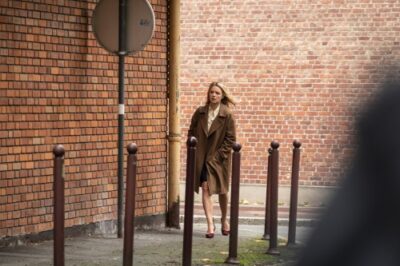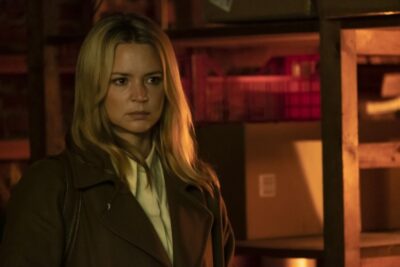We’ve been seeing a lot of the actress Virginia Efira in recent French imports, from Paul Verhoeven’s Elle (2016) and Benedetta (2021), Justine Triet’s Sibyl, Alice Wincour’s Revoir Paris (2022) and Rebecca Zlotowski’s Other People’s Children. She brings utter authenticity and a certain je ne sais quoi that captures her characters’ inner mysteries in a captivating way. Her role in Madeleine Collins, as a woman leading a secret double life split between two households in two countries, demands these qualities of her. The Hollywood Reporter described the film as a “twisted, slightly unhinged and emotionally taut psychological drama.” In a recent interview, the director/co-writer Antoine Barraud said the title “character is so complex, and at times almost perverse, and we needed to create a character that we could be happy to follow for a long time, and go a long way, without ever stopping loving her. Virginie has this ability to remain constantly intriguing: she is very beautiful, but her beauty is neither distant nor threatening, it is positive and appealing. Very quickly, I could imagine no one else but her in this role.”
We open Madeleine Collins August 18 at the Royal and Town Center and August 25 in Glendale.
Efira recently sat for an interview about the film:
WHAT ATTRACTED YOU TO THE MADELEINE COLLINS’ SCRIPT?
It’s quite rare to be sent such a brilliantly written script, which contains something so tailor-made to a genre type of cinema: in an almost mathematical way, each scene adds a new piece to a mysterious personality whose complex nature gradually builds up, but whose elements don’t necessarily seem to fit together. So, there was this thriller-like plot and then, on top of this, a line of questioning that runs all the way through the narrative: what is a person’s true self? Is it only made up of the story of your life? How does one be oneself, etc.? One of my favorite films of recent years is David Fincher’s Gone Girl: a thrilling plot, which reveals a broader and transgressive analysis of intimacy and the social representation of the couple. French cinema is sometimes cautious in its relationship with genre films, and this was perhaps the first script I received that tackled this head on.

DID YOU FIND THAT THE ROLE YOU WERE ASKED TO PLAY IN THIS FILM WAS A ROLE THAT YOU’D NEVER PLAYED BEFORE?
If something interests you, it’s usually because it allows you to experiment with something new, or because it seems intriguing. But I also feel that all the characters I’ve played could get along with each other: the heroine of Madeleine Collins‘ has something in common with Justine Triet’s Sibyl. It’s a subconscious though: you don’t really think about characters that you have or haven’t played before.
Saying that, with this character I identified a theme that interests me: a multiple identity from which outer layers are gradually peeled away, and a character emerges who no longer knows exactly what she has left to offer, in what is a progressive paring back.
Up until now, I’ve often played the opposite: women who break down, and then get back up and are stronger for it. Judith, however, starts off as a strong person and then gradually has the support she relies on taken away. She then has to find a new way of being Judith.

HOW DOES ONE PREPARE FOR A CHARACTER LIKE JUDITH?
I didn’t want Judith to appear to be different or mysterious right from the outset. There is a form of intoxication surrounding her. An aesthetic and emotional intoxication, linked to the story she tells about herself: she has succeeded in hiding a secret, she can be proud of that, it’s not what women do everyday. At the beginning, there is a certain nonchalance about her. She has a loving relationship on the one side, and a loving relationship on the other, and she doesn’t falter – yet. She takes the train, and works on the train, "Oh sorry, was I talking too loud?” And then as events unfold, a vulnerability emerges. I had to conjure this all out of nowhere.
In a role like this, you also have to accept to be a bit out of your depth, so as to be totally open to ideas on set. Certain pieces of music became my signature style: there was a track by Daft Punk – I’ve forgotten the name – which gave the character energy, and forward momentum, like someone who could smash through walls.
On a much grander scale, I remember listening to Bernard Hermann’s soundtrack for the film Vertigo. I didn’t listen to these pieces of music on set, I’m not the type of person to set myself apart when filming. I would arrive on set with all of this in my head: the pieces of music, memories of films, faces, emotions, forgotten thoughts. Then, it was just a case of trying to be open on set to whatever came my way, and open to my acting partners. You absorb something that you’re not entirely sure what it is, and which doesn’t come out exactly as you expected.
DID YOU TRY TO QUESTION WHAT WAS BEHIND JUDITH’S BEHAVIOR? AN EMOTIONAL DEFICIENCY? A FORM OF MADNESS?
We see the relationship she has with her mother. Her mother isn’t exactly very approving nor loving, she comes out with some quite nasty things when she speaks to Judith! Maybe Judith didn’t have a happy childhood. In the illicit and transgressive relationship that Judith has with Abdel, there is also this idea of something that is growing, a secret that gets bigger and bigger and which makes her unable to bear her mother any longer. She never makes a big leap,
but a series of small steps away, which lead to another and another, etc. They never speak about her relationship with Abdel being forbidden. They put it off until later, a very gradual shift gives a form of legitimacy to this relationship.
A psychiatrist would probably have things to say about Judith, and maybe even prescribe her treatment, but when I work on a character, I can’t just look at them clinically. What interests me is imagining the character beyond just the story: how you broaden the path of your daily existence, how you avoid being limited by the confines of your life, the life of someone who has probably always been the perfect wife. Can you only be one person with one name, and does that name have to conform to how people have always seen you?
DO YOU FEEL SORRY FOR JUDITH? DO YOU ADMIRE HER?
You can feel both at the same time, right? But when I was playing her, I was inside her, so the answer is neither! And without making her out to be some great Machiavellian villain, she’s someone who doesn’t do too badly in managing her affairs, and whose actions give her some sense of empowerment.
JUDITH IS ALWAYS ON THE GO. DID YOU BASE YOUR PERFORMANCE ON THIS ENERGY AND DRIVE?
Yes, she’s someone who is always in a hurry. She moves, there’s always somewhere else to be. So she’s pragmatic, she packs her suitcase, then she unpacks it when she arrives, she makes her sandwiches while she talks, and of course all this gives life to a scene. There is also a basic female element of always multitasking: someone who looks after a home – in fact two homes! – and who works at the same time; at one point, it’s not surprising that she can no longer translate her texts! Her hyperactivity is also a mask, she can’t face herself: the moment she sits still and is asked to look at herself, everything becomes blurry, like someone in a lake struggling to reach the shore.
WERE THERE SCENES THAT WERE MORE DIFFICULT THAN OTHERS TO ACT?
I had excellent acting partners who played my two spouses, as well as the young actor who plays Judith’s elder son, he was amazing. Working together, there was something different going on with each actor. Antoine Barraud left us very free with this, he’s a keen spectator and likes to wait and see what actors bring to a scene. He never outlines how he wants you to get from A to B. Some directors do. So, since there is no exact point B, even if you know what the scene is about, the way to get here was slightly different with each take. He allowed us the freedom of jumping into the unknown, and if your subconscious did things right or wrong, it didn’t matter. Sometimes you have to let go of the idea of doing the right thing. The most demanding time for me was in the scenes that required my anger and violence. I put so much into these scenes when I played them, as if my life depended on it. A bit like how a teenager would react, and my body suffered. I should probably calm down a bit.
JUDITH IS EXACTLY WHAT ABDEL AND MELVIL WANT HER TO BE. IS THE JOURNEY SHE TAKES A JOURNEY OF EMANCIPATION, LIBERATION?
Perhaps, but in Judith’s own creation of multiple personalities there’s already a notion of freedom. Responding to multiple expectations always comes down to the same basic belief: I give what is expected of me. Perhaps she is mistaken about what is expected of her. In any case, when I was working on the character, I saw in her a notion of devotion: even if Judith lies, she is always totally present in the moment, and is genuinely concerned about others, whether it be for her husbands or her children.
ANTOINE BARRAUD SUGGESTS THAT JUDITH IS LIKE AN ACTRESS AS ACTING IS A LIE…
That reminds me of something Cocteau once said: “The poet is a liar who always speaks the truth.”
VIRGINIE EFIRA – FILMOGRAPHY
2022 OTHER PEOPLE’S CHILDREN (d. Rebecca Zlotowski)
2022 REVOIR PARIS (d. Alice Winocour)
2021 WAITING FOR BOJANGLES (d. Régis Roinsard)
2021 MADELEINE COLLINS (d. Antoine Barraud)
2021 BENEDETTA (d. Paul Verhoeven)
2020 BYE BYE MORONS (d. Albert Dupontel)
2020 NIGHT SHIFT (d. Anne Fontaine)
2019 SIBYL (d. Justine Triet)
2018 KEEP GOING (d. Joachim Lafosse)
2018 AN IMPOSSIBLE LOVE (d. Catherine Corsini)
2018 SINK OR SWIM (d. Gilles Lellouche)
2017 NOT ON MY WATCH (d. Emmanuelle Cuau)
2016 ELLE (d. Paul Verhoeven)
2016 VICTORIA (d. Justine Triet)
2016 UP FOR LOVE (d. Laurent Tirad)
2015 THE SENSE OF WONDER (d. Éric Besnard)
2015 CAPRICE (d. Emmanuel Mouret)
2013 TURNING TIDE (d. Christophe Offenstein)
2013 COOKIE (d. Léa Fazer)
2013 IT BOY (d. David Moreau)
2012 DEAD MAN TALKING (d. Patrick Ridremont)
2011 MY WORST NIGHTMARE (d. Anne Fontaine)
2010 SECOND CHANCE (d. Nicolas Cuche)
2010 KILL ME PLEASE (d. Olias Barco)
2009 LES BARONS (d. Nabil Ben Yadir)
